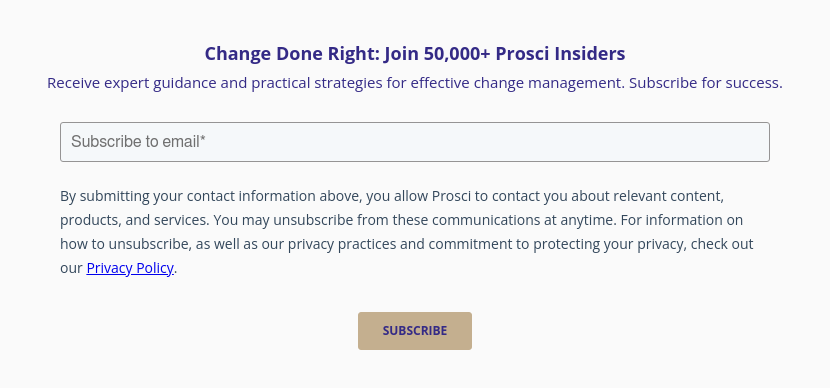Using Plain Language Questions to Enable More Effective Change
2 Mins
Updated: August 2, 2024
Published: June 14, 2023

Like any discipline, change management has a distinct language. This language enables practitioners to communicate clearly, consistently and effectively about what a change means in terms of working differently, anticipated impacts, desired goals, and how success will be measured. However, when you ask change leaders and others engaged with a change what certain terms mean to them, the answers can vary significantly due to differing perceptions of the intent and nature of the change. Change practitioners can use simple yet powerful plain language questions to establish a common understanding of a change, ensure alignment on why the change is needed, and more.
Prosci 3-Phase Process and
Plain Language Questions
Effective change is ultimately about engaging people, working with and through others to achieve success. But when working collaboratively with others, using jargon and buzzwords creates unnecessary barriers. Asking simple, plain language questions can remove these barriers and get all stakeholders on the same page. The Prosci 3-Phase Process incorporates plain language questions into each of the three phases.
The Prosci 3-Phase Process is a structured and scalable process for driving organizational change and one of three main components of the Prosci Methodology. Each phase of the Prosci 3-Phase Process includes three stages, which describe key activities to complete along with associated plain language questions that make the Prosci 3-Phase Process easy to understand and accessible to non-practitioners.
Phases, stages and plain language questions
Within Phase 1 – Prepare Approach, each of the three stages has associated plain language questions that help stakeholders understand the overarching goal of the change management strategy.
- Define Success: What are we trying to achieve?
- Define Impact: Who has to do their jobs differently and how?
- Define Approach: What will it take to achieve success?
 The three stages and associated plain language questions of Phase 2 – Manage Change define the work change practitioners do during the major portion of the lifecycle of a change initiative.
The three stages and associated plain language questions of Phase 2 – Manage Change define the work change practitioners do during the major portion of the lifecycle of a change initiative.
- Plan and Act: What will we do to prepare, equip and support people?
- Track Performance: How are we doing?
- Adapt Actions: What adjustments do we need to make?

- Review Performance: Now, where are we? Are we done yet?
- Activate Sustainment: What is needed to ensure the change sticks?
- Transfer Ownership: Who will assume ownership and sustain outcomes?


The power of plain language questions in change management
Why should we use plain language questions in change management? Because when we ask, we learn.
Questions spur the exchange of ideas, uncovering often surprising insights. The answers provided can fill in gaps in our understanding, revealing important information we might have missed.
Questions pull ideas from others and engage them in finding the answers. And many minds working together increases the odds of coming up with the best ideas, options or solutions.
Asking good questions also focuses energy and attention, guiding people to think about the right things at the right time. A good question can get a team unstuck and completely shift their energy.
Finally, we know from Prosci’s research that involving people directly in a change management effort builds trust and fosters positive working relationships that produce better change outcomes.
5 ways to use plain language questions in change management
The ability to select and ask effective plain language questions is an essential skill for change practitioners. The plain language questions defined for the Prosci 3-Phase Process can enhance your change management efforts in the following ways:
- Explain change management to your sponsor or project team, so they understand what it is and why it is critical to achieving successful outcomes
- Establish a clear definition of success for a change
- Onboard a primary sponsor when starting a change initiative
- Engage a team to collaborate and share information
- Reflect on progress or issues when completing a phase
Better Outcomes From Change Using Plain Language Questions
When we ask questions, we create opportunities to engage people in a change and make them feel valued. Plain language questions offer a simple, yet effective way to get and keep change leaders, impacted individuals and groups aligned throughout the change process—while setting up yourself and your organization for success.


